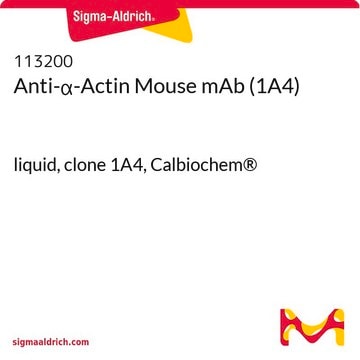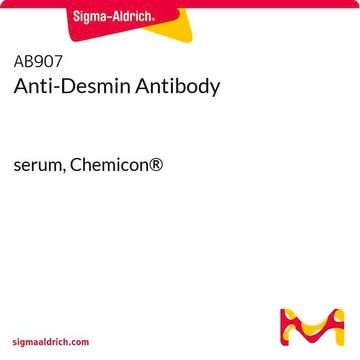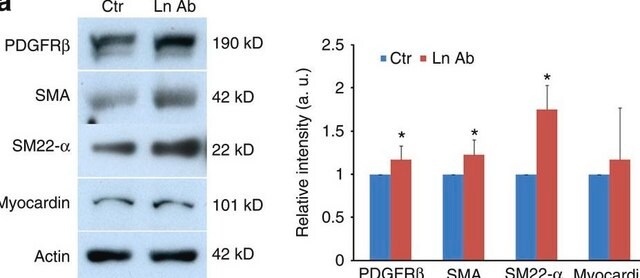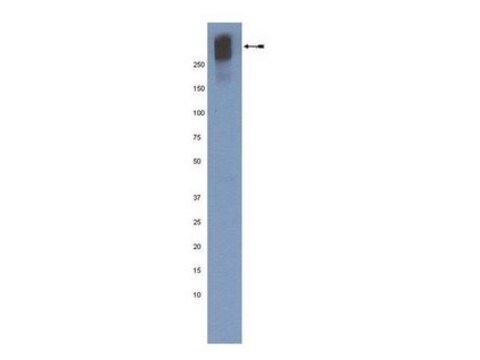ZMS1209
Anti-PNPLA3 Antibody, clone 11C5 ZooMAb® Mouse Monoclonal

recombinant, expressed in HEK 293 cells
Synonyme(s) :
1-acylglycerol-3-phosphate O-acyltransferase PNPLA3, ADPN, Acylglycerol transacylase, Adiponutrin, Calcium-independent phospholipase A2-epsilon, EC:2.3.1.51, Lysophosphatidic acid acyltransferase, Patatin-like phospholipase domain-containing protein 3, iPLA2-epsilon
About This Item
Produits recommandés
Source biologique
mouse
Niveau de qualité
Produit recombinant
expressed in HEK 293 cells
Conjugué
unconjugated
Forme d'anticorps
purified antibody
Type de produit anticorps
primary antibodies
Clone
recombinant monoclonal
Description
clone 11C5
recombinant, expressed in HEK 293 cells
Gamme de produits
ZooMAb® learn more
Forme
lyophilized
Poids mol.
calculated mol wt 52.86 kDa
observed mol wt ~52 kDa
Produit purifié par
using protein G
Espèces réactives
human
Conditionnement
antibody small pack of 25
Caractéristiques du produit alternatif plus écologique
Waste Prevention
Designing Safer Chemicals
Design for Energy Efficiency
Learn more about the Principles of Green Chemistry.
Validation améliorée
recombinant expression
Learn more about Antibody Enhanced Validation
sustainability
Greener Alternative Product
Technique(s)
ELISA: suitable
immunocytochemistry: suitable
immunohistochemistry: suitable
western blot: suitable
Isotype
IgG2aκ
Séquence de l'épitope
Unknown
Numéro d'accès Protein ID
Numéro d'accès UniProt
Autre catégorie plus écologique
Conditions d'expédition
ambient
Température de stockage
2-8°C
Informations sur le gène
human ... PNPLA3(80339)
Description générale
Spécificité
Immunogène
Application
Evaluated by Western Blotting in HeLa cell lysate.
Western Blotting Analysis: A 1:10,000 dilution of this antibody detected PNPLA3 in HeLa cell lysate.
Tested Applications
Western Blotting Analysis: A 1:10,000 dilution of this antibody detected GST-tagged, full-length, recombinant Human PNPLA3.
Immunohistochemistry (Paraffin) Analysis: A 1:100 dilution from a representative lot detected PNPLA3 in Human kidney tissue sections.
Enzyme Immunoassay (ELISA) Analysis: Serial dilutions from a representative lot detected GST-tagged, full-length, recombinant Human PNPLA3.
Immunocytochemistry Analysis: A 1:100 dilution from a representative lot detected PNPLA3 in HepG2 cells.
Note: Actual optimal working dilutions must be determined by end user as specimens, and experimental conditions may vary with the end user.
Description de la cible
Forme physique
Reconstitution
Stockage et stabilité
Informations légales
Clause de non-responsabilité
Vous ne trouvez pas le bon produit ?
Essayez notre Outil de sélection de produits.
Code de la classe de stockage
11 - Combustible Solids
Classe de danger pour l'eau (WGK)
WGK 1
Point d'éclair (°F)
Not applicable
Point d'éclair (°C)
Not applicable
Certificats d'analyse (COA)
Recherchez un Certificats d'analyse (COA) en saisissant le numéro de lot du produit. Les numéros de lot figurent sur l'étiquette du produit après les mots "Lot" ou "Batch".
Déjà en possession de ce produit ?
Retrouvez la documentation relative aux produits que vous avez récemment achetés dans la Bibliothèque de documents.
Notre équipe de scientifiques dispose d'une expérience dans tous les secteurs de la recherche, notamment en sciences de la vie, science des matériaux, synthèse chimique, chromatographie, analyse et dans de nombreux autres domaines..
Contacter notre Service technique







